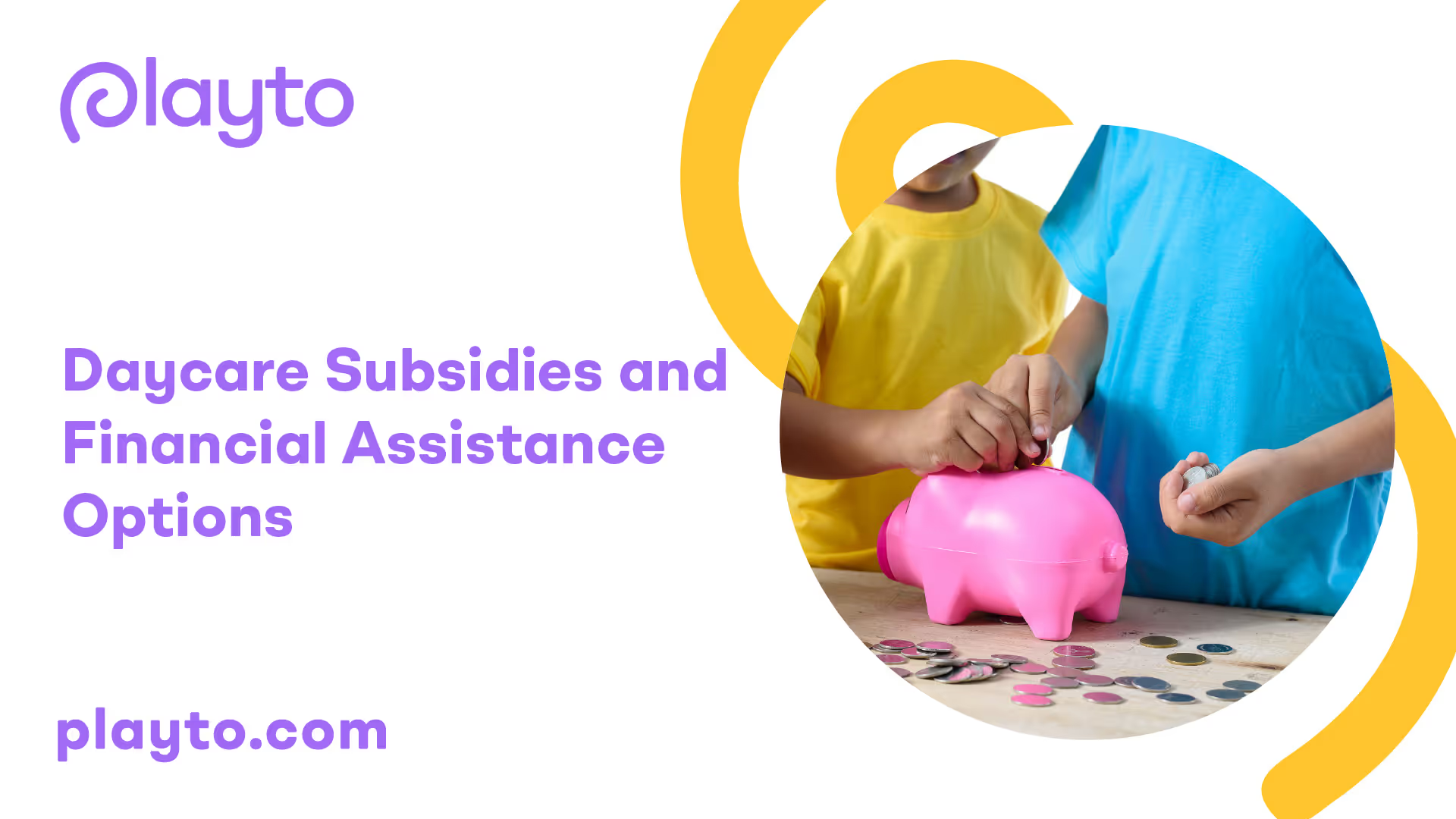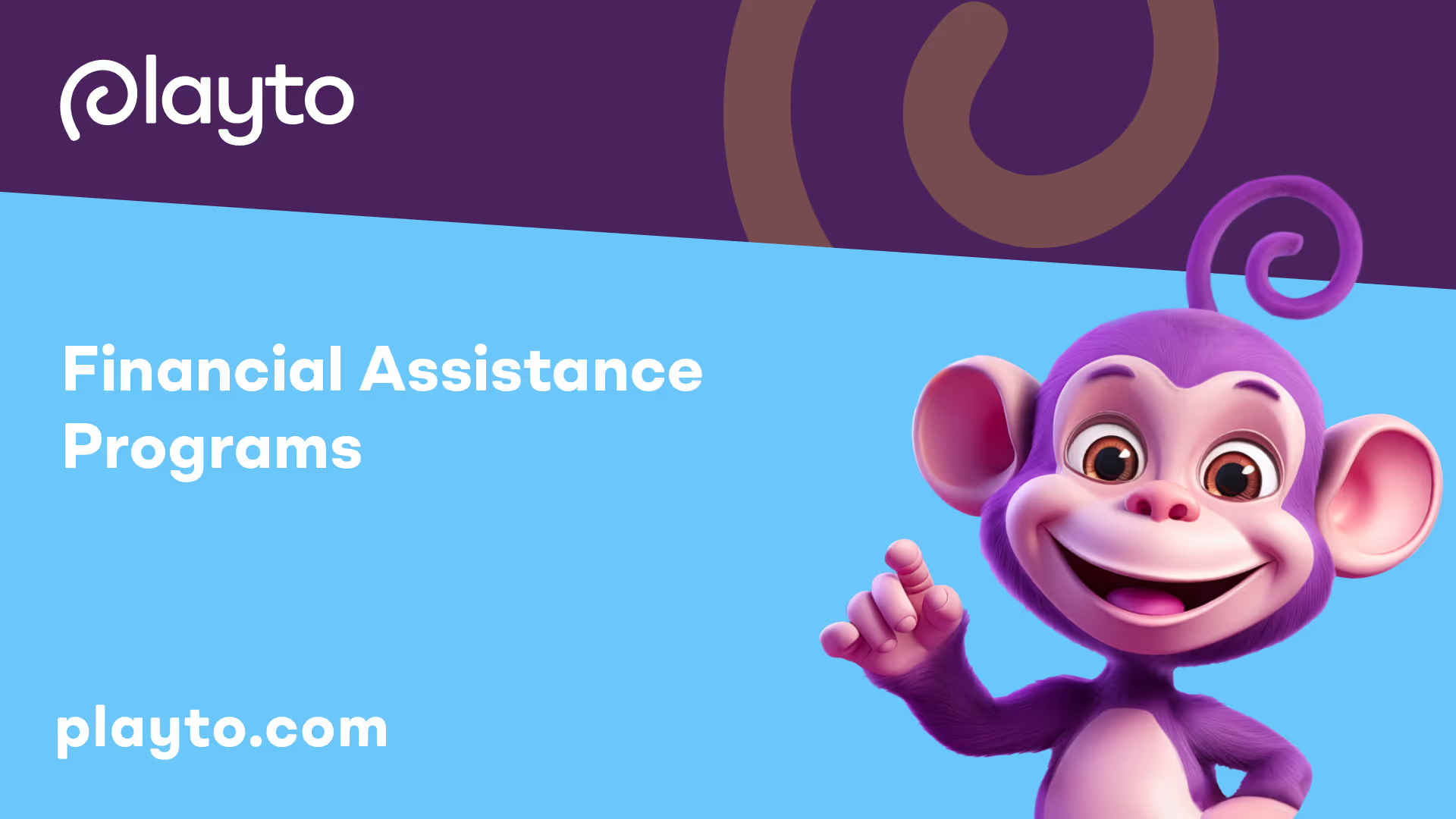Daycare Subsidies Overview
Access to affordable and quality daycare is a crucial concern for many families. Understanding daycare assistance and the importance of subsidies is essential in supporting families' childcare needs.

Understanding Daycare Assistance
Daycare assistance refers to financial support provided to families to help cover the costs of childcare. These subsidies aim to make quality daycare more accessible and affordable for families, particularly those with lower incomes. Subsidies can come from various sources, including state-level programs and federal aid options.
Daycare assistance programs vary by location and eligibility criteria. They are designed to assist families in accessing safe and nurturing environments for their children while they work or pursue educational opportunities. The specific details of daycare assistance programs can be obtained from local childcare agencies or government offices.
Importance of Subsidies
Daycare subsidies play a vital role in supporting families, especially those facing financial challenges. Here are some reasons why subsidies are important:
- Affordability: Childcare costs can be a significant financial burden for many families. Daycare subsidies help alleviate the financial strain, making quality childcare more affordable and accessible.
- Child Development: Quality daycare programs provide a stimulating environment where children can learn, socialize, and develop essential skills. By making daycare more affordable, subsidies enable families to access high-quality childcare that positively impacts their child's development.
- Workforce Participation: Accessible and affordable daycare supports parents' ability to work or pursue educational opportunities. By relieving financial stress, subsidies enable parents to maintain employment, contribute to the economy, and advance their careers.
- Reducing Child Poverty: Daycare subsidies can help reduce child poverty rates by providing families with the means to access quality childcare. This support can improve the overall well-being of children and contribute to their long-term success.
The availability of daycare subsidies and financial assistance options can vary between states and countries. It is important for families to research and understand the specific programs and eligibility criteria in their area. By utilizing daycare subsidies, families can access quality childcare that supports their child's development while alleviating the financial burden. [1]
Financial Assistance Programs
When it comes to accessing affordable daycare options, financial assistance programs can play a crucial role. These programs are designed to provide support to families who may face financial barriers in accessing quality childcare. In this section, we will explore state-level programs and federal aid options available to help families with daycare costs.

State-Level Programs
Many states offer their own financial assistance programs to support families in accessing affordable daycare. These state-level programs vary in terms of eligibility criteria, funding allocation, and the specific services provided. The availability and scope of these programs may depend on the state you reside in.
State-level programs are often tailored to meet the unique needs and priorities of the local community. They may include subsidies or vouchers that help offset the cost of daycare services. Additionally, some programs may offer additional support, such as resources for children with special needs or bilingual daycare programs.
To find out more about the specific state-level programs available in your area, it is recommended to consult your state's childcare agency or department. They can provide information on eligibility requirements, application processes, and the range of services offered. For more information on other daycare-related topics, such as the role of play in early childhood development or tips for securing a daycare spot, check out our articles on the role of play in early childhood development and daycare waitlists: tips for securing a spot.
Federal Aid Options
In addition to state-level programs, there are federal aid options available to support families in accessing affordable daycare. These programs are funded at the federal level and can provide financial assistance to eligible families across the country.
Federal aid options for daycare subsidies and financial assistance include grants and subsidies that are distributed to states, which then allocate the funds to eligible families. The specific programs and eligibility criteria may vary, so it is important to research the options available in your area.
Some of the federal aid programs include the Child Care and Development Block Grant (CCDBG) and the Child Care Tax Credit. The CCDBG provides funding to states to support low-income families in accessing affordable childcare [1]. The Child Care Tax Credit allows families to claim a tax credit for a percentage of their daycare expenses, reducing their overall tax liability [1].
To explore federal aid options and determine eligibility, it is recommended to visit the official website of the U.S. Department of Health and Human Services or consult with a local childcare agency. They can provide detailed information on the available programs, application processes, and any additional requirements.
Financial assistance programs at both the state and federal levels can significantly alleviate the financial burden of daycare costs, making quality childcare more accessible to families. By exploring these options and understanding the eligibility requirements, families can make informed decisions and find the support they need.
Eligibility Criteria
When it comes to accessing daycare subsidies and financial assistance options, there are specific eligibility criteria that individuals and families need to meet. Two key factors considered are income requirements and family size considerations.

Income Requirements
Income requirements play a significant role in determining eligibility for daycare subsidies and financial assistance. The specific income thresholds may vary depending on the program and location. It's important to note that different states and federal aid options may have different income limits.
To determine if you meet the income requirements for daycare subsidies, it is advisable to refer to the guidelines provided by the relevant program or agency. These guidelines typically take into account factors such as household income, the number of dependents, and the cost of living in the area.
For more detailed information on income requirements specific to your state or federal aid options, it is recommended to consult the official resources or websites provided by the relevant authorities. These resources can provide the most up-to-date and accurate information on income eligibility thresholds.
Family Size Considerations
Family size is another crucial consideration when it comes to daycare subsidies and financial assistance. The number of dependents in a household can impact the eligibility criteria and the level of financial support available.
Programs offering daycare subsidies may have different guidelines and calculations for determining family size. In general, family size includes both parents/guardians and their dependents, such as children or other family members under their care.
To better understand how family size is taken into account for daycare subsidies and financial assistance, it is recommended to refer to the specific guidelines provided by the applicable program or agency. These guidelines will outline how family size is defined and how it factors into the eligibility criteria.
By understanding the income requirements and family size considerations, individuals and families can assess their eligibility for daycare subsidies and financial assistance programs. It's essential to consult the official resources and guidelines provided by the relevant authorities to ensure accurate and up-to-date information. [2]
Application Process
Applying for daycare subsidies and financial assistance requires following specific guidelines outlined by your state's childcare assistance program. It's important to understand the application process and gather the necessary documentation to ensure a smooth and successful application.
How to Apply
To begin the application process for daycare subsidies, start by researching and contacting your state's childcare assistance program. This program is typically administered by the state's Department of Human Services or a similar agency. They can provide you with the necessary information and guidance on how to proceed with your application.
Some states may offer online application portals, which can streamline the process and make it more convenient for families in need of financial support. Check if your state provides this option and access the online portal if available. Otherwise, you may need to submit a paper application, which can be obtained from the childcare assistance program.
Once you have the application form, carefully review and complete it, providing accurate and up-to-date information. Take your time to ensure that all required fields are filled out correctly. Incorrect or incomplete information may delay the processing of your application.
Required Documentation
During the application process for daycare subsidies, you will need to provide certain documentation to support your eligibility. The specific documents required may vary depending on your state's childcare assistance program. However, common documents typically requested include:
- Proof of Income: This may include recent pay stubs, tax returns, or a letter from your employer stating your income.
- Proof of Residency: Documents such as utility bills or lease agreements that establish your current address.
- Birth Certificates: Birth certificates for all children in your household may be required to verify their age and eligibility for daycare subsidies.
- Household Composition: You may need to provide information about the members of your household, including their names, ages, and relationships.
It's important to gather all the necessary documentation before starting the application process. This will help ensure a smooth and efficient application. Keep in mind that additional documents may be requested based on your specific circumstances, so be prepared to provide any other relevant documents as requested by the childcare assistance program.
By following the application guidelines and providing the required documentation accurately and completely, you can expedite the approval process for daycare subsidies. If you have any questions or need assistance, reach out to the childcare assistance program in your state for guidance and support.
For more information on daycare and related topics, you can explore articles such as the role of play in early childhood development, daycare waitlists: tips for securing a spot, daycare for children with special needs, and bilingual daycare programs: benefits and considerations.
Benefits of Financial Support
Financial support in the form of daycare subsidies and assistance programs can bring numerous benefits to families. In this section, we will explore two key advantages: the affordability of quality care and the impact on families.
Affordability of Quality Care
Daycare subsidies play a crucial role in making quality care more affordable for low-income families. Studies have shown that low-income families receiving childcare subsidies are more likely to access high-quality care [Source A]. Financial assistance programs have been proven to improve the affordability of quality daycare services [Source B]. By reducing the financial burden associated with childcare expenses, families can ensure their children have access to safe and enriching environments.
Affordable quality care not only provides children with a nurturing and stimulating environment but also contributes to their overall development. It allows parents to choose care providers that prioritize the well-being and educational needs of their children. Quality daycare can foster social, emotional, and cognitive development, preparing children for future academic success and laying a strong foundation for their growth.
Impact on Families
Daycare subsidies and financial support have a positive impact on families. By reducing the financial strain associated with childcare costs, families can better manage their finances and allocate resources to other essential needs. This support can alleviate stress and provide peace of mind, allowing parents to focus on their work and personal responsibilities.
In addition to financial relief, daycare subsidies contribute to improved work-life balance for parents. With access to quality care, parents can pursue their careers or education, knowing that their children are in a safe and nurturing environment. This balance enables parents to contribute to the workforce and pursue personal goals while ensuring their children receive the care and attention they need.
Moreover, families receiving financial support for daycare often experience positive child development outcomes. Children in subsidized care may benefit from access to educational resources, structured activities, and interactions with trained childcare providers. These experiences can enhance their social skills, cognitive abilities, and overall school readiness, setting them on a path to success.
In conclusion, daycare subsidies and financial assistance programs offer significant benefits for families. By making quality care more affordable, these programs ensure that children have access to enriching environments that support their development. Additionally, financial support reduces the strain on families and improves work-life balance, contributing to better outcomes for both parents and children. For more information on daycare-related topics, check out our articles on the role of play in early childhood development, daycare waitlists: tips for securing a spot, daycare for children with special needs, and bilingual daycare programs: benefits and considerations.
Resources and Support
Finding the right daycare and navigating the financial aspect can be overwhelming. Fortunately, there are additional assistance programs and community resources available to help families access the support they need.
Additional Assistance Programs
In addition to daycare subsidies and financial aid options, there are various additional assistance programs that can provide further support to families. These programs may vary by state and locality, so it's important to research the specific resources available in your area. Here are some common types of additional assistance programs:
- Child Care Resource and Referral (CCR&R) Agencies: These agencies offer guidance and information on available childcare options and resources in your community. They can help connect you with licensed providers, provide referrals, and offer information on financial assistance programs.
- Nonprofit Organizations: Many nonprofit organizations focus on supporting families with childcare needs. They may offer scholarships, grants, or sliding fee scales based on income. Research local nonprofit organizations that specialize in childcare support to explore the resources they provide.
- Employer Assistance Programs: Some employers offer daycare assistance programs as part of their employee benefits. These programs may include subsidies, flexible spending accounts, or employer-sponsored childcare centers. Check with your employer to see if they offer any childcare assistance programs.
- Social Services Agencies: Local social services agencies often provide a range of assistance programs, including childcare support. These agencies can provide information on eligibility requirements, application processes, and available resources.
- Community Organizations: Various community organizations, such as churches, community centers, and local charities, may offer daycare assistance or referrals to low-income families. Reach out to these organizations to inquire about any available support programs.
Community Resources
Apart from specific assistance programs, there are other community resources that can help families in their daycare journey. These resources can provide valuable information, support, and connections to childcare providers:
- Parenting Support Groups: Joining local parenting support groups or online communities can provide a wealth of knowledge and support. Other parents can share their experiences, recommend daycare providers, and offer advice on navigating the financial aspects of childcare.
- Local Libraries: Libraries often host events and workshops focused on early childhood development. These can be a great opportunity to learn more about daycare options, financial assistance programs, and connect with other parents in your community.
- Childcare Associations: Research local childcare associations or professional organizations that cater to the needs of families. These associations may have resources, directories, and helpful information on finding quality daycare options and financial assistance.
By exploring additional assistance programs and leveraging community resources, families can access a wider range of support for their daycare needs. Remember to research available programs in your area, reach out to relevant organizations, and connect with other parents to make informed decisions and find the resources that best suit your family's needs.
References
- [1]: https://childcare.gov
- [2]: https://ocfs.ny.gov
- [3]: https://ocfs.ny.gov
